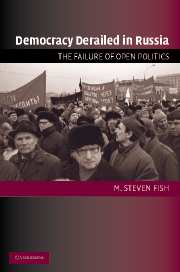Book contents
- Frontmatter
- Contents
- List of Figures and Tables
- Acknowledgments
- Abbreviations
- 1 INTRODUCTION
- 2 SOME CONCEPTS AND THEIR APPLICATION TO RUSSIA
- 3 SYMPTOMS OF THE FAILURE OF DEMOCRACY
- 4 THE RUSSIAN CONDITION IN GLOBAL PERSPECTIVE
- 5 THE STRUCTURAL PROBLEM: GREASE AND GLITTER
- 6 THE POLICY PROBLEM: ECONOMIC STATISM
- 7 THE INSTITUTIONAL PROBLEM: SUPERPRESIDENTIALISM
- 8 CAN DEMOCRACY GET BACK ON TRACK?
- References
- Index
- Titles in the series
6 - THE POLICY PROBLEM: ECONOMIC STATISM
Published online by Cambridge University Press: 05 September 2012
- Frontmatter
- Contents
- List of Figures and Tables
- Acknowledgments
- Abbreviations
- 1 INTRODUCTION
- 2 SOME CONCEPTS AND THEIR APPLICATION TO RUSSIA
- 3 SYMPTOMS OF THE FAILURE OF DEMOCRACY
- 4 THE RUSSIAN CONDITION IN GLOBAL PERSPECTIVE
- 5 THE STRUCTURAL PROBLEM: GREASE AND GLITTER
- 6 THE POLICY PROBLEM: ECONOMIC STATISM
- 7 THE INSTITUTIONAL PROBLEM: SUPERPRESIDENTIALISM
- 8 CAN DEMOCRACY GET BACK ON TRACK?
- References
- Index
- Titles in the series
Summary
One of the most contentious and politically significant debates in social science focuses on the relationship between economic policy and political regime. Social scientists and others continue to differ starkly over even the most fundamental issues.
An especially vigorous polemic swirls around whether measures that enhance the freedom of private economic actors do or do not promote democracy. This debate is immediately relevant to Russia's postcommunist experience. Like other postcommunist countries, Russia has undergone shifts in economic policy that may have shaped its trajectory of political regime change.
The closing pages of the previous chapter presented some evidence that economic freedom and democracy go together. But the matter requires more extensive consideration. The difficulty of measuring economic policy orientation, along with the possibility that the relationship between economic and political liberalism is different in established democracies from what it is elsewhere, suggest the need for closer analysis.
This chapter examines the influence of economic policy orientation on democracy and democratization. The first section reviews the theoretical debate. The second examines the empirical evidence in cross-national perspective. The third addresses potential limitations in the analysis. The fourth considers the logic of the link between liberal economic policy and political regime. The fifth and sixth sections focus on how economic policy has influenced political regime change in Russia. The chapter's main finding is that economic and political liberalism are closely linked and that economic liberalization facilitates democratization in Russia as in the world as a whole.
- Type
- Chapter
- Information
- Democracy Derailed in RussiaThe Failure of Open Politics, pp. 139 - 192Publisher: Cambridge University PressPrint publication year: 2005
- 1
- Cited by



